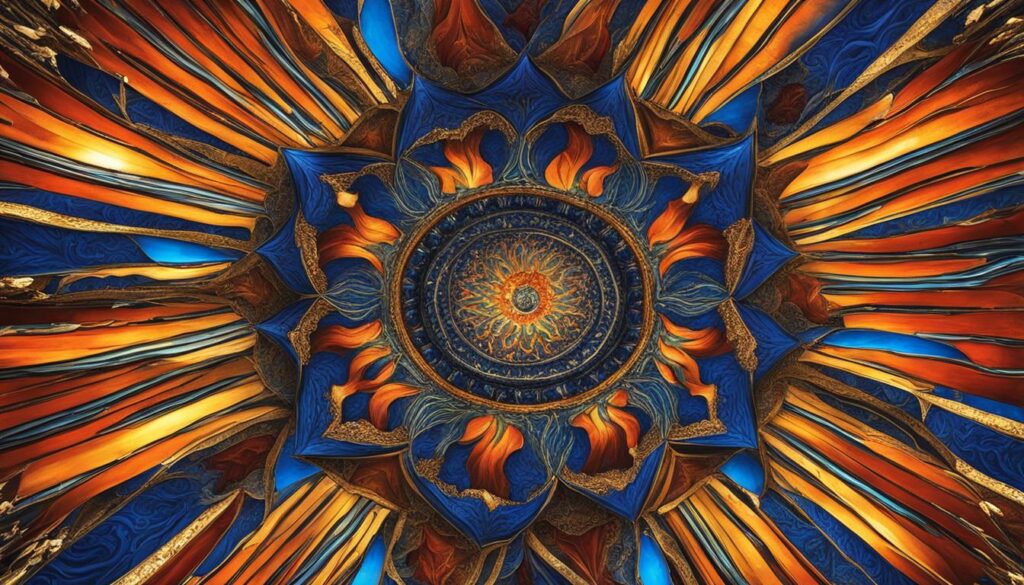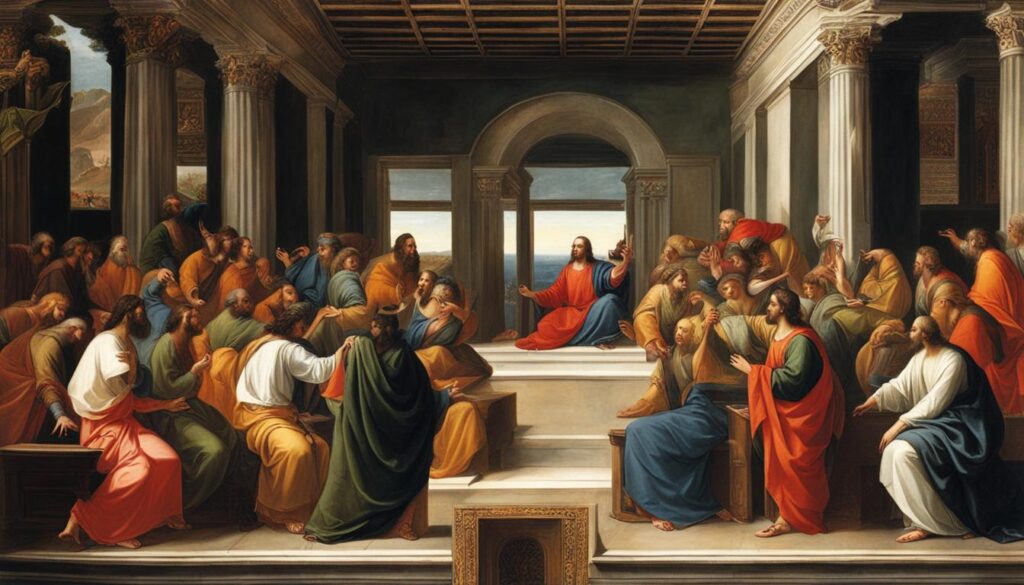In the book of Genesis, a significant verse raises intriguing questions about the audience of God. Genesis 1:26 states, “Let us make man in our image.” This statement has sparked various interpretations and debates among scholars and theologians. In this article, we will delve into the different possibilities surrounding God’s audience in this verse and explore their implications.
Key Takeaways:
- Genesis 1:26 presents a unique opportunity to reflect on who God was addressing when He said, “Let us make man in our image.”
- One interpretation suggests that God was speaking to angelic beings, but this view is not widely accepted.
- The “plural of majesty” explanation posits that God used the royal “we” to assert His sovereignty.
- A common interpretation is that Genesis 1:26 reveals the Trinitarian nature of God as Father, Son, and Holy Spirit.
- Being made in the image of God signifies that humans possess unique qualities and capacities, including reason, morality, and purpose.
God Speaking to Angels
One interpretation suggests that when God said, “Let us make man in our image,” He was addressing the angelic beings. However, this view is not widely accepted, as angels are depicted in the Bible as servants and messengers rather than creators or rulers.
“And God said, ‘Let us make man in our image, after our likeness.'” – Genesis 1:26
Some scholars argue that the use of plural language in this verse could be understood as God consulting with a heavenly council or addressing angelic beings. The belief is that these angelic beings would have played a role in the creative process or held a special position in the divine decision-making. However, this interpretation is not widely supported due to the biblical portrayal of angels as subordinate beings carrying out God’s commands.
The use of plural language in Genesis 1:26 might be seen as a rhetorical device or an expression of God’s greatness, rather than an indication of Him speaking directly to angels. It is important to consider the broader context of the Bible and the specific roles attributed to angels throughout scripture.
Table: The Role of Angels in Creation
| Roles of Angels | Evidence/References |
|---|---|
| Servants and Messengers | Hebrews 1:14, Luke 1:26-38 |
| Praising and Worshiping God | Revelation 5:11-12, Isaiah 6:1-3 |
| Ministering to Believers | Acts 10:1-8, Psalm 91:11-12 |
| Executing Judgment | Matthew 13:41-42, 2 Samuel 24:16 |
As shown in the table above, angels are primarily depicted as servants, messengers, and worshipers of God. Their role in creation is not described as active participation in the act of creation, but rather as fulfilling God’s commands and carrying out His divine will.
Plural of Majesty
Another explanation for the plural form used in Genesis 1:26 is the plural of majesty or the royal “we.” This linguistic device is found in human kings and rulers, who use the plural pronoun to express their authority and power. Some scholars argue that God, as the ultimate King and Ruler, employs this language to assert His sovereignty over creation.
By using the plural pronoun, God emphasizes His divine authority and supremacy. It conveys the idea that He is not alone in His actions, but rather, includes a majestic ‘we’. This usage of the plural form symbolizes God’s greatness and grandeur, portraying His authority as beyond human comprehension.

Just as earthly rulers used the plural pronoun to signify their position of power, God utilizes the ‘plural of majesty’ to assert His unmatched sovereignty over the entire universe. This language of authority highlights God’s supreme reign and His majesty above all kings.
Incorporating the ‘plural of majesty’ into the account of creation in Genesis 1:26 not only showcases God’s authority, but it also magnifies the significance of humanity. By addressing Himself with the royal ‘we,’ God acknowledges the special role and responsibility He has bestowed upon mankind as bearers of His image.
Comparison of the Plural of Majesty and Other Interpretations
| Interpretation | Explanation | Implications |
|---|---|---|
| Plural of Majesty | God using the plural pronoun to express His authority | Highlights God’s supremacy and the special role of humans |
| Divine Council | God addressing heavenly beings or angelic council | Supports the concept of a heavenly court and divine assembly |
| Trinitarian | God speaking as the Father, Son, and Holy Spirit | Reveals the triune nature of God and His involvement in creation |
A Trinitarian Interpretation
One of the most common interpretations of Genesis 1:26 is the Trinitarian perspective, which highlights the nature of God as a Trinity. According to this view, when God said, “Let us make man in our image,” He was speaking as the Father, Son, and Holy Spirit, who together form the triune God.
This interpretation finds support in other biblical passages that speak of the involvement of the Father, Son, and Holy Spirit in the act of creation. For example, in John 1:3, it is stated that “all things were made through him [the Word],” referring to the Son. Similarly, the Holy Spirit is portrayed as active in the creation process in Genesis 1:2.
Understanding Genesis 1:26 from a Trinitarian viewpoint deepens our appreciation of the interconnectedness and unity of the three persons of the Godhead. It reveals the collaborative work of the Father, Son, and Holy Spirit in the creation of humanity, emphasizing the significance of human beings in the divine plan.
This Trinitarian interpretation also sheds light on the relational aspect of God’s nature. The Father, Son, and Holy Spirit are not separate entities who work independently but rather share a perfect unity and communion. This unity is mirrored in the relationship between God and humans, as we are created in the image of the triune God.
Here is a table summarizing the roles of each person of the Trinity in the creation of humanity:
| Person of the Trinity | Role in Creation |
|---|---|
| God the Father | Architect and Author of Creation |
| God the Son | Instrument through whom all things were made |
| God the Holy Spirit | Active presence and empowerment in the act of creation |
Image and Likeness of God
Genesis 1:26 also raises the question of what it means for humans to be made in the image and likeness of God. This phrase does not imply physical resemblance but rather denotes that humans possess certain qualities or capacities that set them apart from other creatures. These qualities include reason, morality, language, personality, and purpose. Humans, like God, have the ability to experience love, truth, and beauty.

“In the image of God He created them; male and female He created them.” (Genesis 1:27)
This verse highlights the intrinsic value and dignity of every human being. Being made in the image and likeness of God means that we share in His divine nature and possess unique capacities that reflect His attributes.
These human attributes and capacities are not found in any other created being. They demonstrate our inherent worth and purpose in the world. Let us explore some of these unique capacities:
| Human Attributes | Description |
|---|---|
| Reason | The ability to think critically, analyze information, and make rational decisions. |
| Morality | The sense of right and wrong, the capacity to make ethical choices, and a moral conscience. |
| Language | The capability to communicate through spoken and written words, expressing complex thoughts and emotions. |
| Personality | The unique set of traits, characteristics, and behaviors that make each individual distinct. |
| Purpose | The awareness of one’s identity, calling, and the pursuit of meaning in life. |
Through these qualities, we reflect God’s image and participate in His divine plan for creation. It is a calling to live in harmony with God, one another, and the natural world, using our unique capacities to love, serve, and cultivate goodness.
Humans as God’s Representatives
Being made in the image of God carries a profound implication – humans are entrusted with the role of representing God and fulfilling His purposes in creation. As God’s representatives, we are given the responsibility to rule over and manage the Earth, acting as stewards of the natural world. This role highlights the unique value and significance of human beings in the grand scheme of creation.
Our position as image-bearers of God grants us the authority to govern and make decisions that align with His divine will. We are called to exercise this authority with wisdom, justice, and compassion, reflecting God’s character and values in our actions and choices.
Like any good ambassador, our role as representatives comes with a duty to care for and protect the environment, ensuring the preservation of God’s creation for future generations. This includes responsibly managing our resources, promoting sustainable practices, and championing initiatives that promote the flourishing of all living beings.
The Role of Humans in Creation
| Responsibilities | Implications |
|---|---|
| Stewardship of the Earth | Humans have the privilege of caring for and managing God’s creation, ensuring its well-being and harmonious existence. |
| Authority to Rule | As God’s representatives, humans are given the authority to govern and make decisions that align with His divine will. |
| Reflection of God’s Character | Through our actions and choices, we have the opportunity to reflect God’s character of love, justice, and compassion to the world. |
| Care for the Environment | Humans are called to responsibly manage our resources and promote sustainable practices to protect and preserve the Earth. |
Our role as God’s representatives is not merely symbolic. It is an active engagement that requires us to fulfill our duties with integrity, humility, and a deep sense of reverence for God and His creation. By embracing our responsibilities as image-bearers of God, we can make a significant impact on the world and contribute to the flourishing of all life.
Scholarly Opinions
Genesis 1:26 has been the subject of extensive scholarly debate and interpretation. Various scholars and theologians have offered their insights into the meaning of this verse, providing different perspectives on who God was addressing. Let’s explore some of the prominent scholarly opinions:
1. Divine Council Theory
Some scholars argue for the divine council theory, suggesting that God was addressing a heavenly assembly or angelic council. According to this interpretation, God is portrayed as consulting with other celestial beings in the decision-making process of creating human beings in His image and likeness.
2. Plural of Deliberation or Self-Encouragement
Another interpretation posits that the plural form used in Genesis 1:26 represents a plural of deliberation or self-encouragement. In this view, God was speaking to Himself, emphasizing the depth of thought and intention behind the creation of humanity.
3. Other Scholarly Perspectives
There are additional scholarly opinions that approach Genesis 1:26 from different angles. Some propose a poetic or rhetorical device, highlighting the use of language to express magnitude and grandeur. Others explore cultural and historical contexts, seeking to understand how the original audience would have interpreted the verse.
Each interpretation brings unique insights and implications to our understanding of Genesis 1:26. The scholarly opinions challenge us to examine the rich complexity of this verse, as we explore its theological, literary, and cultural significance.
To provide a clearer picture, let’s now summarize some of these scholarly opinions in a table:
| Scholarly Opinion | Explanation |
|---|---|
| Divine Council Theory | God addressing a heavenly assembly or angelic council |
| Plural of Deliberation or Self-Encouragement | God speaking to Himself, emphasizing intentionality |
| Other Scholarly Perspectives | Poetic or rhetorical device, cultural and historical context |

The Original Intended Meaning
While later Christians have seen in Genesis 1:26 a reflection of the Trinity, it is important to note that the original author’s intention was likely not to convey a trinitarian message. The original context likely pointed to God addressing His heavenly court or angels. The concept of the Trinity emerges more fully in the New Testament, building upon these earlier passages.
In understanding the original intended meaning of Genesis 1:26, it is crucial to consider the cultural and historical context in which this verse was written. The ancient Israelites believed in a divine council, a heavenly assembly of supernatural beings that surrounded God and played a role in His governance of the world. This perspective is reflected in other biblical passages where God is depicted as consulting with these heavenly beings in matters of creation and justice.
“God has taken his place in the divine council; in the midst of the gods he holds judgment.” – Psalm 82:1
Therefore, when God said, “Let us make man in our image,” He may have been addressing the members of this divine council, including angels or other heavenly beings. This interpretation aligns with the polytheistic worldview prevalent during that time, as well as the understanding that God’s power and rule extended beyond the physical realm.
It is important not to read later theological developments, such as the doctrine of the Trinity, an explicitly Christian concept, into the original text. While the theology of the New Testament expands and deepens our understanding of God’s nature, it should not retroactively be applied to the ancient Hebrew scriptures. The concept of the Trinity is a profound mystery that evolved and was gradually revealed over time, with its roots in the Old Testament.
By acknowledging the original intended meaning of Genesis 1:26 as referring to God’s interaction with His divine council, we gain a richer understanding of the cultural and theological context in which the text was written. This insight allows us to engage with the biblical narrative on its own terms and appreciate the progressive nature of divine revelation.
In the next section, we will explore the implications and significance of Genesis 1:26, considering how these interpretations shape our understanding of God’s nature and the relationship between God and humans.
Implications and Significance
The interpretation of who God was speaking to in Genesis 1:26 has profound implications for our understanding of God’s nature and the relationship between God and humans. This verse carries significant weight in shaping our understanding of the unique value and purpose of humanity, as well as the invitation for humans to actively participate in the ongoing work of creation and stewardship.
When we explore the implications of Genesis 1:26, we are confronted with the fundamental truth that as humans, we reflect the image of God. This implies that we possess qualities and capacities that set us apart from other creatures, such as reason, morality, language, personality, and purpose. We share in God’s creative nature, with the ability to experience love, truth, and beauty.
“So God created man in his own image, in the image of God he created him; male and female he created them.”
By recognizing the significance of being made in the image and likeness of God, we are reminded of our responsibility to act as God’s representatives on Earth. This implies that we have been given the authority to rule over and manage the rest of God’s creation. We are called to be good stewards of the natural world, taking care of it with wisdom and reverence.
It is through the understanding and embodiment of this divine image that we find our purpose and value as human beings. Our lives gain significance as we embrace our role in the ongoing work of creation and stewardship, contributing to the flourishing of both the human community and the natural world.
The Significance of Genesis 1:26
Genesis 1:26 carries immense theological and practical significance. This verse not only informs our understanding of human identity and purpose but also shapes our relationship with the Creator and the created world.
Firstly, the significance lies in the recognition of the divine invitation for humans to participate in the creative process. God, as the ultimate Creator, invites us to co-create and bring forth goodness and beauty in the world. This understanding calls us to actively engage in transforming our surroundings, cultivating relationships, and shaping society in ways that reflect God’s character.
Furthermore, the significance of Genesis 1:26 lies in the affirmation of human dignity. Being made in the image and likeness of God establishes the inherent worth and value of every human life. This truth compels us to treat one another with respect, compassion, and justice, recognizing the dignity and worth of every individual, regardless of their differences or circumstances.
The significance of Genesis 1:26 extends beyond the realm of human relationships. It underscores our responsibility to care for the natural world. As image-bearers of God, we are tasked with stewardship, acknowledging that the Earth and all its creatures bear the imprint of the divine. This understanding compels us to be conscious of our actions and their impact on the environment, advocating for sustainability and responsible living.
Ultimately, the implications and significance of Genesis 1:26 go far beyond mere interpretation. They call us to embrace our identity as image-bearers of God, to recognize the inherent value and dignity of every human life, and to actively engage in the ongoing work of creation and stewardship.
| Implications | Significance |
|---|---|
| Recognition of the uniqueness and value of humanity | Affirmation of human dignity and worth |
| Call to participate in the co-creation process | Emphasis on responsible stewardship of the world |
| Reminder of our role as God’s representatives on Earth | Challenge to cultivate relationships and shape society |
Conclusion
The interpretation of who God was addressing in Genesis 1:26 remains a topic of debate and exploration. While different theories have been put forth, ranging from angels to the Trinity, it is essential to approach these interpretations with humility and respect for the text’s original context. Ultimately, Genesis 1:26 invites us to reflect on the profound truth that as humans, we are made in the image of God, with unique capacities and responsibilities in the world.





